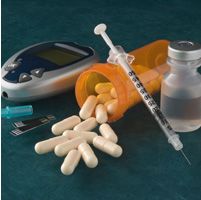FDA Panel Recommends Adding New Safety Warnings to Labels of 3 Diabetes Drugs
An advisory panel for the US Food and Drug Administration (FDA) held a hearing yesterday focusing on safety issues associated with two diabetes medications. Although the panel's recommendation did not include specific treatment changes, its decision highlighted the fact that more research is needed on cardiovascular risk associated with this class of diabetes medications.

An advisory panel for the US Food and Drug Administration (FDA) held a hearing yesterday focusing on safety issues associated with two diabetes medications. Although the panel’s recommendation did not include specific treatment changes, its decision highlighted the fact that more research is needed on cardiovascular risk associated with this class of diabetes medications.
The Endocrinologic and Metabolic Drug Advisory Committee looked at heart failure risk found during the Saxagliptin Assessment of Vascular Outcomes Recorded in Patients with Diabetes Mellitus (SAVOR) study. The study looked at whether AstraZeneca’s Onglyza (saxagliptin) “has an acceptable cardiovascular risk profile,” according to a statement from the company.
The study was a double-blind, placebo-controlled look at the effects of saxagliptin for cardiovascular risk in type 2 diabetes patients.
“SAVOR met the primary safety objective, demonstrating that Onglyza did not increase the risk of cardiovascular death, nonfatal myocardial infarction and nonfatal ischemic stroke when added to a patient’s current standard of care, with or without other antidiabetic therapies, as compared to placebo,” the company noted.
The committee voted 13-1 in favor that there was an acceptable risk profile, and also saw 14 out of 15 members “recommend that the FDA supplement the products’ labeling to add new safety information.” The additional information would be included on the labels of both Onglyza and Kombiglyze XR, which is a combination of saxagliptin and metformin HCI extended-release.
As part of the final result of the hearing, one member voted that the drug be pulled from the market, while the company itself said further work will be done “to better understand the signal of hospitalization for heart failure found in the SAVOR results.”
A similar result was announced for Takeda’s Examination of Cardiovascular Outcomes: Alogliptin vs. Standard of Care (EXAMINE) study. In this instance all 16 members of the committee voted that an acceptable cardiovascular disease risk level was shown for the drug Nesina (alogliptin).
In a second vote, 13 members of the committee “voted that safety information from the EXAMINE study should be added to the alogliptin labeling,” according to a statement from Takeda. Three members voted that no changes were needed.
“Patients with diabetes are at an increased risk of cardiac related morbidities such as heart disease and stroke, as well as hospitalized heart failure and cardiac death,” William B. White, MD, a professor at the Calhoun Cardiology Center at the University of Connecticut was quoted as saying in the Takeda press release. This Advisory Committee recommendation “provides important information about alogliptin that may be useful for prescribing physicians as they consider appropriate treatment options for Type 2 diabetes.”